
Christine Choi Receives Summer Fellowship and Publishes Research in Academic Journal
Christine Choi, a graduate student in our department, has received a Summer Graduate Fellowship from the University of Pittsburgh Humanities Center. This prestigious fellowship, which provides $10,000 of summer support, fosters multidisciplinary humanities research and connections with the Center's networks.
Christine has been using her fellowship to expand a chapter of her dissertation, exploring traumatic public memory, violence, and new media representations of Japanese and U.S. military "comfort women" during and after WWII. Following the Center’s annual theme on “Method,” she is refining her "co-creative iterative writing process" method, drawing from autoethnography, oral history, and Conquergood's "dialogic performance." As part of the fellowship, she will participate in the Humanities Center's colloquiums throughout the academic year and share her research on Thursday, Oct. 31st from 12:30-2:00 PM with the community.
Another part of her project was published in the Howard Journal of Communication, titled "(Re)Animating ‘Comfort Women’ Memories: Fantastical Abstractions and Metaphorical Violence." This article, part of a special issue on memory infrastructures, examines the intersection of public memory, violence, and new media representations through Sujin Kim’s animated short film, Unforgotten. Christine uses close reading to identify four main representations of "comfort women": as metaphorical objects, surreal alternative bodies, physical land, and unseen implied forms. She explores the affordances and limitations of animation, demonstrating its potential for addressing sensitive subjects with metaphorical and fantastical elements, creating narratives that replicate the fragmented memories of “comfort women.” Despite historical efforts to silence these narratives, Christine highlights how Kim’s film provides an alternative mode of representing and witnessing stories of the past.
